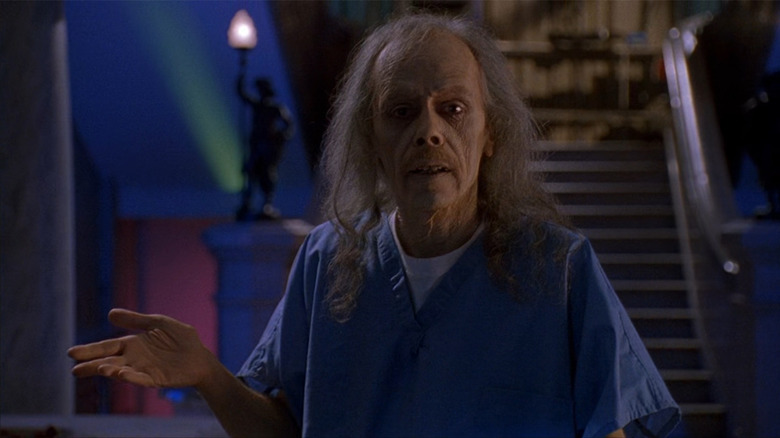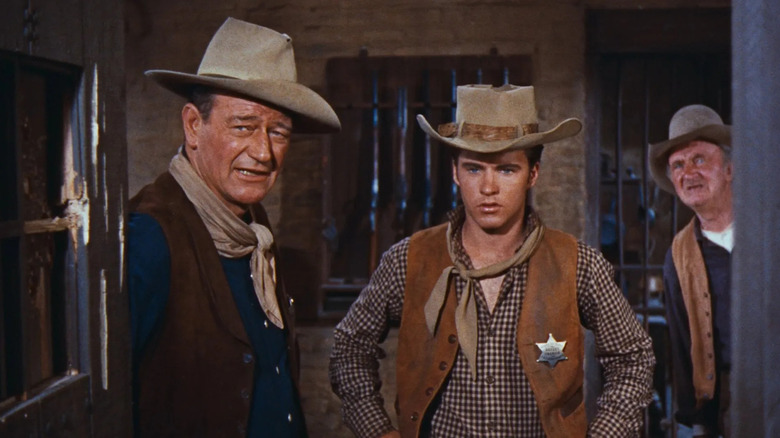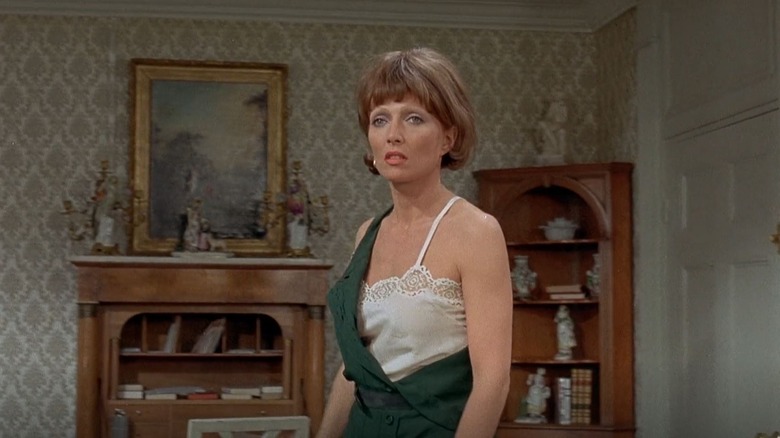Horror Icon John Carpenter's Favorite Movies Surprisingly Aren't Scary
It hardly needs repeating, but director John Carpenter is known for making multiple horror classics, including "Halloween," "The Fog," "Christine," "The Thing," "Prince of Darkness," "In the Mouth of Madness" and "Vampires." Although Carpenter doesn't have a notable, recognizable style or motif in his filmography (apart from recurring actors) he does seem to possess a subtle, natural mastery of filmmaking craft that makes all his films, even the bad ones, imminently watchable.
Carpenter loves horror, of course, but oddly, he's not a horror guy at heart. He possesses an old-world workman's attitude when it comes to filmmaking, just sort of sussing out, by instinct, how to shoot a scene, regardless of genre. Carpenter has given multiple interviews where he's talked about monster movies and sci-fi flicks that inspired him (he loved "Forbidden Planet" as a boy, as well as Godzilla movies), but moreso, Carpenter talks about the films of John Ford and Howard Hawks, two American filmmakers best known for their high-profile Westerns. Carpenter even considers some of his own genre films to be Westerns, most notably his "Assault on Precinct 13," which is a remake of the 1959 Western "Rio Bravo." The man loves him some Howard Hawks.
Once every decade, the British Film Institute hosts the Sight and Sound poll, asking hundreds of notable critics and filmmakers what their ten favorite movies are. Carpenter was invited to participate in 2022, and of his ten favorite movies, four of them were directed by Howard Hawks. Two of his top 10 were high-profile John Wayne-starring Westerns (one of which was made by John Ford, and the other by ... Howard Hawks), and exactly zero of them were horror movies. Carpenter may be friendly with the horror community, but he's a cineaste of the highest order, fond of Hollywood classics, and even a few notable surrealist satires from Europe. Carpenter may have been influenced by monster movies, but, if given his druthers, he'd rather tune into TCM or the Criterion Channel.
40% of Carpenter's favorites are by Howard Hawks
Carpenter listed, perhaps predictably, that "Rio Bravo" was one of his favorites. The premise is novel and pliable: John Wayne plays a local sheriff who arrests the brother of a powerful local rancher. The rancher (John Russell) spends the bulk of the movie using force to free his brother from the local jail, while Wayne assembles a ragtag group of defenders (Dean Martin) among them, to defend the jail. As mentioned, "Assault on Precinct 13" was a remake of "Rio Bravo," but set in the modern day, with people defending a police precinct in South-Central Los Angeles.
Also from Hawks' filmography came 1939's "Only Angels Have Wings," a stirring thriller-cum-romance about hotshot delivery pilots — Cary Grant chief among them — who constantly fly dangerous missions to meet their commercial contracts. The pilots have become cavalier with their lives, as it's only a matter of time before they die. The flying sequences are wonderful, and Jean Arthur gives a great performance. Curiously, "Only Angels Have Wings" served as one of the primary inspirations for the 1990s animated series "TaleSpin."
Carpenter is also fond of Hawks' 1932 crime drama "Scarface," starring Paul Muni as the gangster Tony Camonte. It's not a direct biopic of Al Capone, but it's close. And, yes, Hawks film is also the basis of Brian De Palma's 1983 film "Scarface."
Most surprisingly, Carpenter expressed an affinity for Hawks' 1938 film "Bringing Up Baby," often celebrated as one of the best screwball comedies of all time. In the film, Cary Grant plays a stuffy paleontologist who happens to meet a free-spirited scatterbrain, Susan, played by Katharine Hepburn. The "Baby" of the title is Susan's pet leopard, and many shenanigans ensue with the pair trying to wrangle the animal.
Carpenter's other six favorites
The one John Ford movie on Carpenter's list is "The Searchers," a film about two heroic blowhards trying to rescue a kidnapped relative from a tribe of Native Americans. The film feels lost, like old-world masculinity is already gone.
It also seems that John Carpenter — because he has impeccable taste — is a big fan of the masterful Luis Buñuel. Of Buñuel's many classics, Carpenter was most fond of 1962's "The Exterminating Angel" and 1972's "The Discreet Charm of the Bourgeoisie." The former film is about a group of wealthy aristocrats who meet at a local manse to have an extravagant meal. After dinner, however, none of the guests can leave. They're not being held prisoner. They are merely compelled to stay, unable to physically walk out the door. Days pass. Then months. No one can leave. "Discreet Charm," meanwhile, also skewers the wealthy by presenting a gaggle of well-to-do a-holes, all having affairs, as they assemble for dinner. Each time they sit down, however, something interrupts them. It's one of the best films ever made.
Perhaps not surprisingly, Carpenter has one of Alfred Hitchcock's most celebrated films on his list: 1958's "Vertigo." Many neophytes find "Vertigo" to be oblique and stodgy, but it's one of those films that gets better the more you know about filmmaking and the more you know about Hitchcock. Given that Carpenter is a master of craft, one can see why he'd be drawn into the impeccable technicals of "Vertigo." Carpenter also likes Roman Polanski's "Chinatown," which remains one of cinema's great — and bleak — detective stories.
And, finally, Carpenter loves Orson Welles' 1966 film "Chimes at Midnight," a reworking of Shakespeare's two "Henry IV" plays. Welles plays Falstaff, and the story is told from his perspective. It's a stirring revision of the Bard's work, while still being dynamic, funny, and even a little self-effacing.
This list makes me want to hire Carpenter for a month-long film festival at a repertory cinema.


